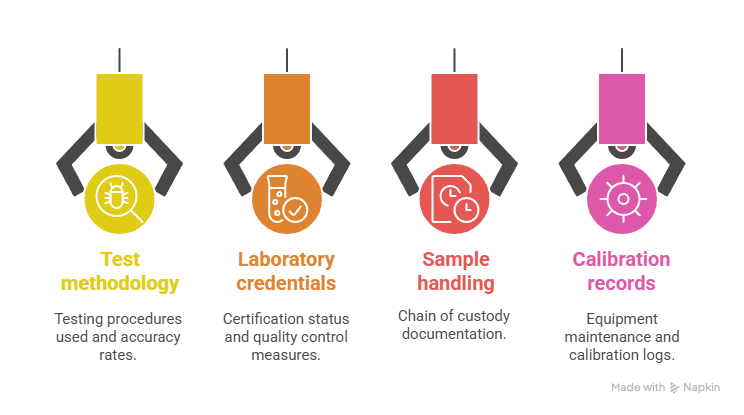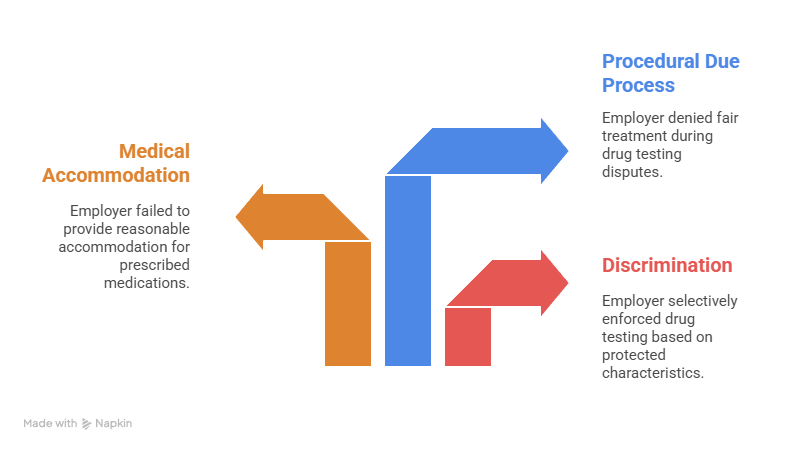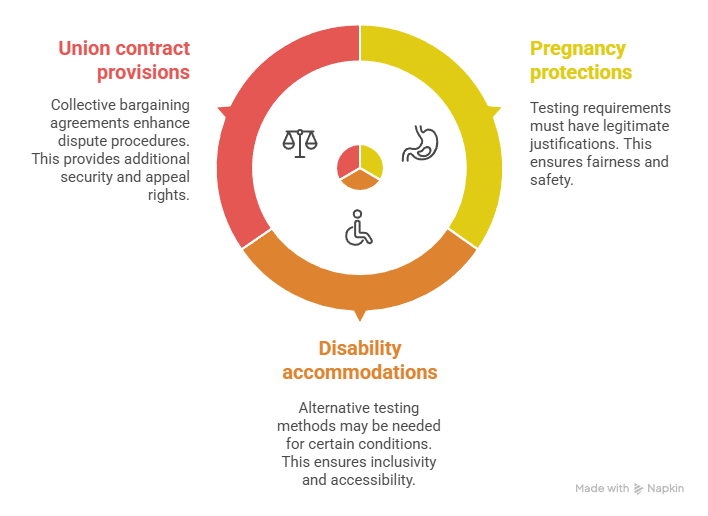Texas employees facing false positive drug test results have limited but important legal options despite the state's at-will employment laws, with specific protections under the Texas Commission on Human Rights Act and federal regulations. Understanding these rights and proper dispute procedures can help protect your employment and prevent wrongful termination in the competitive Texas job market.
Key Takeaways
- Texas at-will employment laws allow most terminations without cause, but employers must follow proper drug testing procedures to avoid discrimination claims.
- False positive drug test disputes require immediate action, including requesting retests, providing alternative explanations, and documenting all communications with employers.
- The Texas Workforce Commission provides specific guidelines for workplace drug testing that employers must follow to maintain legal compliance.
- Medical marijuana patients and prescription drug users have limited protections under Texas employment drug testing law, requiring careful documentation of legitimate use.
- Right-to-work provisions in Texas don't eliminate employee protections against improper drug testing procedures or discriminatory enforcement.
- Professional legal consultation becomes essential when employers refuse to acknowledge testing errors or fail to follow established protocols.
Understanding Texas Employment Drug Testing Laws in 2025
Texas maintains some of the most employer-friendly drug testing regulations in the United States. The state operates under comprehensive at-will employment principles. However, this doesn't mean employees have zero protections when facing false positive results. The Texas Labor Code allows employers to implement drug testing programs with minimal restrictions. Nevertheless, they must follow established procedures and maintain consistent application across all employees.
The state's approach to employment drug testing balances employer safety concerns with basic employee rights. Texas law requires employers to provide written notice of drug testing policies. Additionally, employers must maintain chain of custody procedures. They must also offer opportunities for employees to explain positive results. These requirements create important opportunities for workers to dispute false positive outcomes.
Current statistics show that approximately 15% of Texas employers conduct pre-employment drug screening in 2025. Furthermore, an additional 8% implement random testing programs. The right-to-work status doesn't eliminate due process requirements. Therefore, proper dispute procedures become crucial for protecting employment relationships. Texas false positive drug test dispute cases have increased by 12% since 2024, highlighting the importance of understanding your rights.
Common Causes of False Positive Drug Test Results
Several factors can trigger false positive drug test results in Texas workplace screenings. Medical conditions, prescription medications, and even common foods can interfere with standard testing procedures. Understanding these triggers helps employees prepare stronger disputes when facing questionable results.
| Cause Category | Common Examples |
| Prescription Medications | Adderall, codeine, morphine, benzodiazepines, amphetamines |
| Over-the-Counter Products | Pseudoephedrine, ibuprofen, ranitidine, diphenhydramine |
| Food and Supplements | Poppy seeds, hemp products, tonic water, protein powders |
| Medical Conditions | Diabetes, kidney disease, liver dysfunction, pregnancy |
Medical explanations carry significant weight in dispute proceedings. This is particularly true when supported by proper documentation from healthcare providers. Texas employment drug testing law recognizes that legitimate medical treatments can trigger positive results. Consequently, employers must provide reasonable accommodation processes for employees who can demonstrate lawful prescription use or medical necessity.
Your Rights During Drug Test Disputes in Texas
Texas employees retain specific rights during drug test dispute processes. These protections exist even within the state's right-to-work framework. The rights stem from federal anti-discrimination laws, state labor codes, and established workplace safety regulations that govern testing procedures. Moreover, the Texas Commission on Human Rights provides additional oversight for discriminatory practices.
Immediate Response Rights
When facing a positive drug test result, Texas employees have several immediate rights. First, you can request detailed information about the testing process. Second, you can demand laboratory procedures documentation. Third, you can access a chain of custody records. Employers must provide access to these materials within reasonable timeframes. Typically, this means 48-72 hours after initial notification.
You can demand retesting of the original sample using different methodology. Alternatively, you can request split-sample analysis if available. Many testing facilities automatically preserve samples for 30-90 days. This preservation creates opportunities for independent verification through accredited laboratories.
Medical Review Officer Consultation
Texas regulations require employers using certified testing programs to provide Medical Review Officer consultations. This applies specifically to positive results. The MRO represents an independent physician review process. It allows employees to present medical evidence, prescription documentation, and alternative explanations for positive findings.
The MRO consultation represents your primary opportunity to challenge false positive results. This happens before employers make termination decisions. Prepare comprehensive medical records beforehand. Also gather prescription histories and any relevant health documentation that might explain the positive result. The consultation typically occurs within 72 hours of the initial positive result.
Documentation and Evidence Rights
Employees have the right to obtain copies of all testing documentation. This includes the original test results, chain of custody forms, and laboratory certifications. Additionally, you can request information about the testing facility's accreditation status. You also have the right to know which specific substances were detected and at what levels.

- Test methodology details: Information about which testing procedures were used and their accuracy rates
- Laboratory credentials: Certification status and quality control measures of the testing facility
- Sample handling records: Complete chain of custody documentation from collection to analysis
- Calibration records: Equipment maintenance and calibration logs from the testing date
These documentation rights ensure transparency in the testing process. They also provide essential evidence for successful dispute resolution.
Step-by-Step Dispute Process for False Positive Results
Taking immediate action following a positive drug test notification significantly improves your chances of successful dispute resolution. Texas employers appreciate proactive communication and documented responses that demonstrate professionalism and accountability. The dispute process must begin within 24-48 hours of notification to preserve all available options.
The dispute process begins with formal notification to your employer's human resources department. You can also contact the designated testing coordinator. Request written confirmation of the positive result immediately. This should include specific substances detected, testing methodology used, and applicable company policies governing the dispute process. Document the date and time of all communications throughout the process.
Next, gather all relevant medical documentation that might explain the positive result. Contact your healthcare providers for prescription records and medical statements. Request expedited processing of these documents, as time limitations apply to most dispute procedures. Many Texas physicians are familiar with employment drug testing disputes and can provide appropriate documentation quickly.
Consider requesting independent laboratory testing through an accredited facility. Many laboratories in Texas provide expedited reanalysis services specifically designed for employment disputes. These services typically produce results within 24-48 hours. Independent testing offers the strongest evidence for disputing false positive results, especially when using more advanced testing methodologies.
Finally, maintain professional communication with your employer throughout the dispute process. Provide regular updates on your evidence gathering efforts. Submit all documentation in writing with delivery confirmation. Keep detailed records of all conversations, emails, and formal communications. This documentation becomes crucial if legal action becomes necessary.
At-Will Employment Limitations in Drug Testing Cases
While Texas maintains strong at-will employment protections for employers, several important limitations apply specifically to drug testing situations. These restrictions create opportunities for wrongful termination claims when employers fail to follow proper procedures. Additionally, they protect employees when employers ignore legitimate dispute evidence. Understanding these limitations helps employees recognize when their rights have been violated.

- Discrimination Protection: Employers cannot selectively enforce drug testing policies based on protected characteristics. This includes race, gender, age, or disability status. Inconsistent application of testing requirements may indicate discriminatory practices. For example, testing only younger employees or targeting specific ethnic groups violates federal anti-discrimination laws.
- Medical Accommodation: The Americans with Disabilities Act requires reasonable accommodation for employees using prescribed medications for legitimate medical conditions. Texas employers must engage in good-faith interactive processes to determine appropriate workplace modifications. This might include modified duties, schedule adjustments, or alternative safety measures instead of immediate termination.
- Procedural Due Process: Even at-will employees deserve fair treatment during drug testing disputes. Employers who refuse to consider evidence face potential liability. Similarly, those who deny retest opportunities or ignore medical explanations may face wrongful termination claims. Texas courts have recognized that basic fairness requirements apply even in at-will employment situations.
Protected Class Considerations
Certain employee groups receive additional protections during drug testing disputes in Texas. Pregnant employees cannot be subjected to different testing standards without medical justification. Employees with documented disabilities have rights to reasonable accommodation during testing procedures. Union members may have additional protections under collective bargaining agreements.

- Pregnancy-related protections: Different testing requirements must have legitimate medical or safety justifications
- Disability accommodations: Alternative testing methods or modified procedures may be required for certain conditions
- Union contract provisions: Collective bargaining agreements often provide enhanced dispute procedures and appeal rights
These protections create additional avenues for challenging unfair drug testing practices. They also provide stronger grounds for legal action when employers violate established procedures.
Employer Compliance Requirements
Texas employers must follow specific compliance requirements when implementing drug testing programs. First, they must provide written notice of testing policies to all employees. Second, they must maintain consistent application across all employee groups. Third, they must use certified laboratories for all testing procedures.
Employers must also provide clear dispute procedures in their written policies. These procedures must include reasonable timeframes for evidence submission. They must also specify the types of evidence that will be considered. Additionally, employers must designate responsible personnel for handling disputes and maintaining confidentiality throughout the process.
When to Seek Legal Assistance
Consulting with employment law attorneys becomes essential when employers refuse to acknowledge testing errors. Legal assistance is also crucial when employers fail to follow established dispute procedures. Texas offers strong legal protections for employees facing discriminatory treatment or procedural violations during drug testing programs. However, navigating these protections requires specialized knowledge of both state and federal employment law.
Consider professional legal consultation if your employer refuses retest requests. Also seek legal help if they ignore medical documentation or terminate employment without allowing proper dispute resolution. Attorneys specializing in Texas employment law understand the complex interplay between at-will provisions and federal anti-discrimination protections. They can evaluate your case and determine the best course of action.
The Texas Commission on Human Rights provides additional resources for employees facing potential discrimination during drug testing disputes. Filing formal complaints creates official records that strengthen potential legal claims. These complaints also encourage employer compliance with proper procedures. Additionally, the Equal Employment Opportunity Commission handles federal discrimination claims related to drug testing practices.
Warning signs requiring legal intervention include selective enforcement, procedural violations, discrimination indicators, and retaliation concerns. Selective enforcement occurs when drug testing is applied inconsistently across similar employees or situations. Procedural violations involve employers ignoring chain of custody requirements, testing protocols, or dispute procedures. Discrimination indicators include testing decisions that correlate with protected characteristics or recent workplace complaints. Retaliation concerns arise when negative employment actions follow discrimination complaints or legal inquiries.
Preventing Future Drug Testing Issues
Proactive strategies help Texas employees avoid false positive drug test complications while maintaining compliance with employer policies and state regulations. Understanding testing methodologies, disclosure requirements, and documentation best practices creates stronger protection against wrongful accusations. Prevention is always more effective than dispute resolution after problems arise.
Maintain detailed records of all prescription medications, over-the-counter supplements, and medical treatments that might influence drug test results. Create a comprehensive medication log that includes dosages, prescribing physicians, and treatment dates. Update this log regularly and keep copies both at home and in a secure workplace location. This documentation becomes invaluable if drug testing issues arise unexpectedly.
Notify employers in advance when starting new medications that could trigger positive findings. This is particularly important for controlled substances or compounds with known cross-reactivity issues. Many employers appreciate advance notice and can make accommodations to prevent false positive complications. Proactive communication also demonstrates good faith compliance with company policies and builds trust with management.
| Prevention Strategy | Implementation Steps | Expected Benefits |
| Medication Documentation | Maintain prescription records, dosage logs, physician statements | Clear evidence for dispute resolution, faster processing |
| Advance Disclosure | Notify HR before testing when using triggering medications | Reduced surprise results, improved employer relations |
| Healthcare Coordination | Discuss employment requirements with treating physicians | Professional medical support, proper documentation |
Regular communication with healthcare providers about employment drug testing requirements ensures proper prescription management and documentation. Many Texas physicians provide specific letters explaining medication necessity and expected testing impacts for patients facing workplace screening requirements. These letters carry significant weight during dispute proceedings and can prevent termination decisions based on false positive results.
Resources and Support Options in Texas
Texas provides numerous resources for employees facing drug testing disputes and related employment issues. Understanding these resources helps workers access appropriate assistance and support during challenging situations. Additionally, knowing where to find help can make the difference between successful dispute resolution and wrongful termination.
The Texas Workforce Commission offers comprehensive information about employee rights and employer responsibilities regarding workplace drug testing. Their website provides detailed guidance on proper testing procedures, dispute resolution options, and legal protections for workers. The Commission also maintains a hotline for employees with questions about their rights during drug testing situations.
Legal aid organizations throughout Texas provide free or low-cost assistance to employees facing workplace discrimination or procedural violations. Texas Legal Aid maintains offices in major metropolitan areas and offers telephone consultations for rural residents. The State Bar of Texas also provides lawyer referral services to connect employees with qualified employment law attorneys in their local areas.
Employee assistance programs offered through many employers provide confidential counseling and support services during workplace disputes. These programs often include legal consultation services and can help employees navigate complex employment issues. Additionally, union representatives provide advocacy and support for covered employees facing drug testing disputes.
Conclusion
Navigating Texas false positive drug test disputes requires understanding both your limited rights under at-will employment law and the specific protections available through federal regulations and state procedural requirements. While Texas employers maintain significant termination authority, they cannot ignore proper testing procedures, medical evidence, or discrimination protections during drug testing programs. Taking immediate action to document evidence, request retesting, and seek professional consultation provides your best opportunity for successful dispute resolution. Remember that right-to-work status doesn't eliminate due process requirements, making knowledge of proper dispute procedures essential for protecting your employment in Texas's competitive job market.
Frequently Asked Questions
Can my employer fire me for a false positive drug test in Texas?Â
Yes, Texas at-will employment laws generally allow termination for positive drug test results, but employers must follow proper dispute procedures and consider medical evidence. If you can prove the result was false and your employer ignored proper protocols, you may have grounds for wrongful termination claims.
How long do I have to dispute a positive drug test result in Texas?Â
Most Texas employers provide 48-72 hours for initial dispute notification, with formal dispute processes typically allowing 5-10 business days for evidence submission. Act immediately upon receiving positive results to preserve all available options and ensure sample integrity.
Do I have to tell my employer about prescription medications before drug testing?Â
While not legally required in Texas, advance disclosure of prescription medications that might trigger positive results protects you from surprise terminations and demonstrates good faith compliance with company policies. This proactive approach often prevents dispute complications.
Can I request an independent retest of my drug test sample?Â
Yes, Texas employees can request retesting of original samples or split-sample analysis when available. Most certified laboratories preserve samples for 30-90 days, allowing independent verification through different testing methodologies or facilities.
What protection do medical marijuana patients have in Texas employment drug testing?Â
Texas medical marijuana patients have very limited employment protections, as most employers can still terminate for positive THC results regardless of legal use. However, procedural protections still apply, requiring proper dispute processes and consideration of medical documentation.
Should I hire a lawyer for my false positive drug test dispute?Â
Consider legal consultation if your employer refuses retest requests, ignores medical evidence, or shows signs of discriminatory enforcement. Employment attorneys can evaluate whether procedural violations or discrimination occurred, potentially creating wrongful termination claims despite at-will employment status.
Additional Resources
- Texas Workforce Commission - Drug Testing Guidelines
https://www.twc.texas.gov/businesses/drug-testing-guidelines - Texas Commission on Human Rights - Employment Discrimination
https://www.tchr.texas.gov/employment-discrimination - U.S. Department of Labor - Drug-Free Workplace Requirements
https://www.dol.gov/agencies/odep/program-areas/substance-abuse - Texas State Bar - Employment Law Resources
https://www.texasbar.com/AM/Template.cfm?Section=Employment_Law - SAMHSA - Workplace Drug Testing Information
https://www.samhsa.gov/workplace/legal/federal-laws-regulations - Texas Legal Aid - Employment Rights
https://texaslawhelp.org/category/employment-rights

GCheck Editorial Team
Meet the GCheck Editorial Team, your trusted source for insightful and up-to-date information in the world of employment background checks. Committed to delivering the latest trends, best practices, and industry insights, our team is dedicated to keeping you informed.
With a passion for ensuring accuracy, compliance, and efficiency in background screening, we are your go-to experts in the field. Stay tuned for our comprehensive articles, guides, and analysis, designed to empower businesses and individuals with the knowledge they need to make informed decisions.
At GCheck, we're here to guide you through the complexities of background checks, every step of the way.






